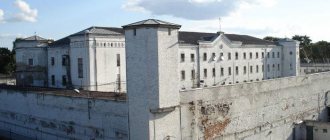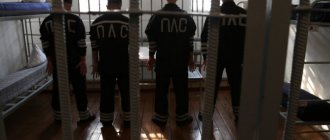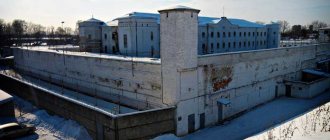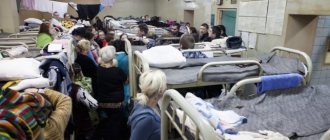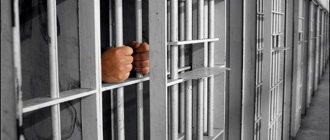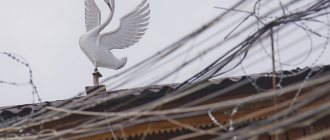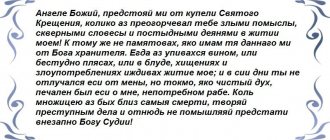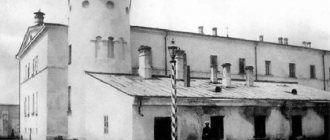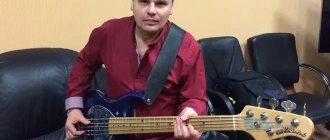| Carefully! This article may contain obscene language (obscene words and expressions). To hide inappropriate words when editing an article, you can use Template:Censorship |
Wikipedia as a prison
— the observation that Wikipedia is similar to places of deprivation of liberty, that is, a prison (in another version, a concentration camp). However, Wikipedia itself usually compares a ban (blocking) to a prison, rather than being on Wikipedia. The observation is based on materials from Russian Wikipedia.
What are the types of colonies and who is sent to them?
According to Art. 74 of the Criminal Executive Code of the Russian Federation, adult convicts serve sentences of imprisonment in colonies. These institutions are divided into settlement colonies, general, strict and special regime correctional colonies. The type of correctional colony in which the convicted person must serve his sentence is determined by the court.
Article on the topic “There are more decent people than in the wild.” Report from the colony of Kokorin and Mamaev The colony-settlements contain prisoners convicted of intentional crimes of minor and medium gravity and crimes committed through negligence. Also, positive convicts from a general or strict regime colony can be transferred there. In settlement colonies, convicts are kept without guards, but under the supervision of the administration. They can move freely around the colony during the hours from waking up to bedtime, and with the permission of the administration of the institution, they can travel outside its boundaries. Prisoners are allowed to wear civilian clothes, they can carry money with them and use it without restrictions. Convicts, as a rule, live in dormitories specially designed for them; they may be allowed to live with their families both on the territory of the colony and outside it.
In general regime colonies, first-time convicted citizens who have committed a serious crime, as well as careless or intentional crimes of minor or moderate gravity, serve their sentences, unless the court sends them to a settlement colony.
Maximum security correctional colonies house men who have been convicted for the first time of committing particularly serious crimes. Male recidivists who have previously served imprisonment are also placed there.
Men who have had a particularly dangerous relapse into crime, as well as those sentenced to life imprisonment, serve their sentences in special regime colonies.
In correctional colonies of general, strict and special regime, there are three types of conditions for serving a sentence: ordinary, light and strict. In normal and light conditions, convicts live in dormitories, in strict conditions - in locked rooms. Prisoners serving life sentences are kept only in cells, usually of no more than two people. Depending on the type of colony and conditions of detention, convicts have the right to a varying number of visits with loved ones, telephone calls, parcels and parcels.
Women in the Russian Federation can serve their sentences in general regime colonies, as well as in settlement colonies.
Minors or convicts left there until they reach the age of 19 serve their sentences in educational colonies. Also, in such colonies there may be isolated areas that function as general regime correctional colonies; they contain prisoners who turned 18 years old while serving their sentences.
Table of differences
In order for you to better understand the difference between a prison and a colony, we suggest you familiarize yourself with the table below:
| Jail | The colony | |
| Movements around the territory | Excluded. The criminal leaves the cell only for walks and meetings under the supervision of guards. | Since the institution resembles a village (there are even shops there), prisoners can visit places in accordance with the regime and its form. |
| Job | Hardly ever. | Work plays a major role in your stay here. |
| Correction | Unlikely. | It can leave an imprint on life, thereby removing the possibility of further bad deeds. |
| Varieties | There is none of them. | It can be strict, therapeutic, correctional, and educational, made specifically for children. |
Reference. Prisoners serving their sentences in a colony can earn money and spend it on food.
Read articles on the following topics:
- What is disbat?
- A guardhouse in the army: how does it differ from a disbat and what does a cell look like?
- What is the difference between a zone and a prison?
How is a prison different from a colony?
In colloquial Russian speech, the word "prison" is often used to refer to any institution in which convicted persons serve a sentence of imprisonment. However, according to the Criminal Executive Code (EC) of the Russian Federation, a prison is a separate type of correctional institution.
Article on the topic
When going to a pre-trial detention center is salvation. How HIV infection is treated in Moscow prisons Those who have been sentenced to imprisonment for a term of over five years for committing especially serious crimes, as well as for certain crimes such as terrorism, hostage-taking, organizing an illegal armed group, hijacking are placed in prisons. plane, train or watercraft, seizure of power. Prisons also house particularly dangerous repeat offenders and those who were transferred from correctional colonies for malicious violation of the order of serving their sentences.
Prisoners are kept in locked general cells and, in special cases, in solitary confinement. As a rule, a prison is a separate building or a complex of buildings, while a colony occupies a large area with industrial premises and a residential area; on the territory of the colony there may be a store, a club, a library, a school and even a football field.
Period of settling into the cell. Features of behavior
It is believed that the most difficult test for a prisoner is meeting convicts. In the zone, this stage is called “registration”. In our article, you can find out not only how to survive in prison, but also how to properly get to know the convicts so that the term of imprisonment does not turn into a series of serious trials.
It is important to know how to behave when meeting convicts. In each prison, “registration” is completely different. As a rule, a beginner is asked questions with meaning. It is for this reason that you need to be careful and not say anything unnecessary. Under no circumstances behave aggressively towards other convicts, even if you are an athlete and confident in your abilities. This is no coincidence, because in prison everyone lives “by rules”, and any thoughtless word towards a local authority can result in a series of trials for you.
When entering the cell, do not rush, walk at a slow and measured pace. It is imperative to say hello and get to know everyone. It is worth paying attention to the fact that when meeting convicts for the first time, you should under no circumstances extend your hand to shake hands. This is no coincidence, because in prisons there are categories of citizens who are not greeted in this way.
The recommendations that are described in our article will allow you to figure out how to survive in prison. Thanks to them, if you are convicted, you will be able to quickly adapt to the zone and preserve your physical and mental health as much as possible.
What is a pre-trial detention center and who is kept in it?
Pre-trial detention centers (SIZOs) are primarily used to hold suspects and accused persons against whom detention has been applied as a preventive measure. Those. Those who are under investigation and awaiting trial or are on trial are placed in pre-trial detention centers.
Detention centers in some cases also serve as correctional facilities. They contain convicts left there to perform household maintenance work, and convicts who are to be sent to correctional institutions to serve their sentences after the court verdict has entered into legal force. Also, convicts are admitted to pre-trial detention centers during their transfer from one place of serving their sentence to another.
Prison jargon
As we said earlier, prisons have their own language jargon. In our article you can find out the meaning of some words and phrases.
On the territory of the prison you can often hear the phrase citizen chief. It has several meanings. First of all, this phrase is used when addressing surveillance inspectors and security. In this way, the convicts demonstrate their respect for the administration. As we said earlier, the phrase “citizen boss” is used in different variations. This is often addressed not only to the administration, but also to prison authorities.
On the territory of the zone, the convicted person may be offered chifir. Few people know, but this is a strong tea that includes a large amount of tea leaves. As a rule, it is drunk by prisoners who do not want to go to bed.
It is worth noting that you should never steal on prison grounds. In the zone, such people are called rats. As a rule, such prisoners are subjected to constant violence and humiliation.
What is a temporary detention facility?
The place for pre-trial detention is also the temporary detention center (IVS), previously called the pre-trial detention cell (KPZ). Temporary detention facilities are not part of the structure of the Federal Penitentiary Service, but belong to special institutions of the Ministry of Internal Affairs of the Russian Federation. They are located at the territorial internal affairs bodies or border guard authorities. Temporary detention centers are used for temporary detention of persons detained on suspicion of committing a crime. If the court subsequently decides to choose a preventive measure in the form of detention, the suspects will be transferred to a pre-trial detention center.
General information about prison concepts
If you do not want your life in the zone to turn into a series of humiliations and trials, then you need to respect the local rules. It is no secret that convicts in prison set their own laws. You can find out their features in our article. We strongly recommend that you study them.
Thieves' concepts and their observance will allow you to take your rightful place in the prison hierarchy. Few people know, but all those convicted belong to one caste or another. In general, all prisoners can be divided into lawbreakers, authorities, socially maladapted and statistically average. The most important place in the prison hierarchy is occupied by authorities, but socially unadapted prisoners are constantly subjected to humiliation and violence. It is worth noting that not all newly arrived convicts know that thieves’ concepts prohibit eating food from the parcel on their own. The prisoner must share food in order to avoid conflict situations in the future.
It is worth noting that sexual topics are under no circumstances allowed to be discussed on prison grounds. This is not accidental, because convicts who live by the rules react aggressively to certain types of sexual contact. Any thoughtless word can result in a bad reputation.
What is a special detention center?
Another penitentiary, i.e. A correctional institution of the Russian Federation, part of the structure of the Ministry of Internal Affairs of the Russian Federation, is a special detention center. It contains persons sentenced to administrative arrest. According to Art. 3.9. Code of Administrative Offenses of the Russian Federation, this type of punishment is prescribed for the most serious offenses (malicious disobedience to a lawful order or requirement of a police officer, petty hooliganism, etc.), if other punishments, such as a fine, are not enough. In Russia, the minimum period of administrative arrest is 12 hours, and the maximum is 30 days.
Items of prison production
Most of the convicts work in the zone. Almost every prison has a huge variety of production machines. Thanks to them, convicts can not only work, but also receive wages for this. As a rule, prisoners sew uniforms and create forged and wooden products. Those convicts who can draw well make paintings and icons. Subsequently, handmade items are exported. They are in great demand. This is no coincidence, because the price of the finished product is quite low, but its quality will please even the most demanding buyer.
"Polar Owl"
The colony was built in the Yamalo-Nenets Autonomous Okrug. The Polar Owl is home to 330 criminals, some of whom have killed hundreds of people. The buildings are old and in disrepair. The prison conditions are as bad as the weather. In winter, the air temperature stays at –40. Only one month of the year is summer - July. The Polar Owl houses murderers, state criminals, extremists and repeat offenders.
After the trial of FSIN Lieutenant Colonel Yuri Sandrykin, it became known that prisoners were beaten and abused. Comfortable cells are equipped for “exemplary” criminals. Prisoners are not taken outside; they walk in a square room without a ceiling, but with bars. Alexander Pichushkin, the “Bitsevsky maniac” who killed 48 people, lives in such conditions; Dmitry Voronenko - “Petersburg Maniac”, with 4 lives to his name; Denis Evsyukov is a former policeman who shot people in a store; Nurpasha Kulaev - Beslan terrorist.
"Vladimir Central"
Mikhail Krug’s song “Vladimir Central” is known not only by all former and current prisoners, but also by fans of chanson. An interesting fact is that the artist, indeed, often performed in this prison in the 90s. In his songs, he showed his view from the inside, how the life of those sentenced to life appeared before him.
Photo: RIA Novosti
The colony was built in the Vladimir region in 1783. There is enough space for 1221 criminals. In the 40s, Joseph Stalin's son Vasily served his sentence in this prison. Since names were not allowed to be made public, he was assigned a number. Only after the death of the “leader” the surname was returned to his son. On the prisoner's card he was listed as Vasily Pavlovich Vasilyev. He was imprisoned for “misappropriation of funds.”
Journalists are not allowed on tours of the old buildings, but when the new one was demonstrated, it became clear that the criminals had no chance of escaping. Each convict is allocated 4 square meters according to the European standard. m. The floors are self-leveling, so hiding knives or sharpening points between wooden boards will not work. The doors are equipped with unauthorized opening sensors. The premises are equipped with video surveillance cameras, which allows you to monitor prisoners 24 hours a day.

